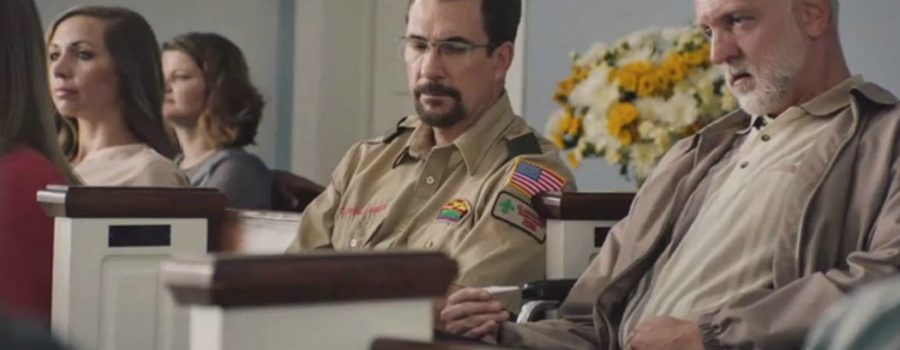[Published at Film Inquiry] If the horror genre in film is experiencing a renaissance, then 2018 is the peak of that renaissance. At least, for now. With the cornucopia of new storytellers emerging within or entering the genre, horror is showing no signs of slowing down in neither quality nor quantity. Jordan Peele, John Krasinski, Luca Guadagnino, and Mike Flanagan are all filmmakers that have either begun their directorial careers in the horror genre, uncharacteristically entered it, or are contributing to this prestigious streak in horror recently. Add Duncan Skiles to the growing list of talent surfacing in the film industry with the ability to frighten the bejesus out of the masses. The Clovehitch Killer marks Skiles‘s feature directorial debut, though he’s directed television films and series as well, including some with his frequent collaborator and The Clovehitch Killer screenwriter Christopher Ford.
Viewers may recognize Ford‘s name from his writing credit on 2017’s well-received Spider-Man: Homecoming, and, to a lesser extent, the Eli Roth-produced horror film, Clown, both directed by Jon Watts. However, he’s written material for Skileson The Scariest Show on Television, The Fuzz, and Our RoboCop Remake.
The Clovehitch Killer is Ford‘s third foray into horror, and Skiles‘s first. It is largely, though, Skiles‘s film That isn’t to discredit Ford‘s writing, but Skiles‘s direction creates such a building tension, that each frame increasingly overflows with a sickening sense of foreboding dread. By using a small town backdrop, or “Everytown, USA,” as star Samantha Mathis, who plays the matriarch, Cindy, of the seemingly functional nuclear family that is the central focus of the film, refers to it to follow the story of the town killer, absent for 10 years, now active again.
The Clovehitch Killer is equal parts a coming-of-age family drama and a noir horrorthriller. Dylan McDermott as the patriarch, Don, Charlie Plummer as the son-turned-amateur-detective, Tyler, and Mathis give lived in, realistic performances, selling what is, a story that relies on realism. This could happen anywhere, and that is, perhaps the most chilling aspect of the film.
The Arrival Of Duncan Skiles
Duncan Skiles has been working in the film industry in some capacity or another, whether it’s as an editor, writer, producer, director, or actor, for almost fifteen years. However, with The Clovehitch Killer, he only just now seems to have found his forte, if you will, in directing horror. It is, by no means, a small feat, directing a successful horror film. Historically, horror spits out more critically trashed films than any other genre does. Countless straight-to-VOD flops, theatrical box office disasters, and critical mishaps weigh down the stature of the horror genre.

However, the horror genre is an easy genre for first-time filmmakers to cross the infamously high, high barriers-to-entry in the film industry because of its traditionally DIY, low-budget nature, and a marked emphasis on thrills over story. Filmmakers either make a name for themselves as visual auteurs, gain notoriety for making controversial subject matter that exists for the sake of shock value, create a by-the-numbers feature to, hopefully, build a safe career upon, craft a critical disaster, or direct a thoughtful, quality horror film that, like all good horror, incorporates several other genres through stratified storytelling. Skiles proves himself as both the first and the latter.
For a serial killer film, there is a refreshing lack of blood, and, for that matter, killing, throughout The Clovehitch Killer. What Ford, and, particularly Skiles focus on is building suspense. Creating tension that rises to a boiling point. Simple flashes of old polaroids, news articles, Luke McCoubrey‘s gloomy cinematography, and McDermott‘s eerie, disquieting performance add to the pot of tension stew that the Skiles and Co. boil up for the audience. Clovehitch isn’t particularly dialogue-driven, which Skiles uses to great advantage. He let’s each moment linger. When Don stalks the town. When Tyler slowly uncovers the horrifying, bitter truth about the town’s serial killer.
Smalltown, USA
It could be the person you see at the grocery store. It could be your teacher. It could be a local business owner. It could be your neighbor. In a small town, nearly everyone, and in a lot of cases, everybody knows each other. Alas, when something like a series of unsolved murders turns up in one’s area code, there is, virtually, no way but to risk a dangerous confrontation in going out everyday. Weston, Connecticut in The Last House On The Left, Haddonfield, Illinois in the Halloween series, Springwood, Ohio in the A Nightmare On Elm Street series, Woodsboro, California in the Scream series, and the list goes on. Ford and Skiles choose to put their serial killer horror film in a small town in Kentucky.
There is a sense of claustrophobia in every frame of The Clovehitch Killer once it is revealed that a killer is on the loose; there is no escape in this close-knit town. Don is a significant person in this rural Kentucky suburb. He’s the Boy Scout leader, an active church member, and appears, by all standards, to be the polite gentleman next door from an outside perspective. Even to the members of his own family. That is, until Tyler finds something that could ruin Don’s model reputation.

What viewers don’t see very often in films featuring serial killers as central characters or as plot devices is how the killer’s actions might affect their families. The viewer is exposed to Don’s reformed life first. The part of his life during which he’s supposedly tried to make amends for whatever might have happened in the past. The part during which he has successfully blended in with other human beings. He has a family that loves him. A child that depends on him.
Real-Life Parallels & Psychopathology
The Clovehitch Killer‘s narrative parallels the killings of Dennis Lynn Rader, or the BTK Stranger. In the film, the killer follows the same modus operandi of the BTK Strangler almost exactly from the 10-year hiatus, to his method of “binding,” “torturing,” and “killing” (hence the self-appointed name), his fetish with women’s underwear, to him being a member of Christ Lutheran Church and a Cub Scout leader. BTK committed his crimes in Wichita, Kansas, mirroring the small town in Kentucky in The Clovehitch Killer.
Psychopathology plays a big part in the sub-narrative. Ford and Skiles explore two sides of a serial killer. On one side, the audience observes a mild mannered man who interacts socially with the townsfolk. On the other side, the audience catches glimpses of a psychopath with a history of violence who engages in sexual sadism: the recipe for a serial killer. Furthermore, as shown through the character of Don, some of these people with psychopathic tendencies can have a significant charismatic, authoritative influence over people.

In an interview with Film Threat, Skiles said that, although he partly based this film on BTK, among other killers, he didn’t want to explicitly say so, so as to not give them any unnecessary attention. McDermott gives, arguably, the finest performance of his career as Don. The way he can maneuver from calm and collect in one moment, to desperately trying to prove his innocence in another, all while every manipulative action is serving his ulterior motives, is captivating to watch.
Conclusion: A Worthy 2018 Horror Addition
The Clovehitch Killer absolutely deserves to be mentioned in the same sentences, lists, and receive as much press and accolades as bigger studio titles such as Suspiria, A Quiet Place, Hereditary, Halloween, and The Haunting of Hill House have and undoubtedly will continue to receive. However, unfortunately, an independent film such as this, with limited theatrical release and not a significant amount of market apart from word-of-mouth buzz, can’t compete, both financially, and in the context of the bigger studio system that cycles through more marketed films over the course of awards season and beyond. IFC Midnight continues to distribute solid indie horror films, and The Clovehitch Killer is no exception.
With Ford‘s well-written script, three-dimensional characters, superb acting, particularly McDermott‘s terrifying turn, and Skiles‘s assured direction that utilizes an intimate, rural setting, The Clovehitch Killer is a creepy coming-of-age serial killer noir.
Did you find The Clovehitch Killer‘s deliberate pace to be effective? What did you think of McDermott’s performance? Where do you think The Clovehitch Killer ranks in comparison to some of this year’s other great horror films? Tell us your thoughts in the comments below!
The Clovehitch Killer opened to a limited theatrical release and on VOD platforms on November 16, 2018. For more information on its release, click here.
Opinions expressed in our articles are those of the authors and not of the Film Inquiry magazine.








Leave a Reply
Your email is safe with us.